ARGtek Communication ARGTEK-1000 802.11 b/g CPE (Access Point) User Manual AIP W608H datasheet word file 2
ARGtek Communication Inc. 802.11 b/g CPE (Access Point) AIP W608H datasheet word file 2
Users manual
Wireless LAN Device Series
CPE2615
User Manual
v20070520
Preface
This guide is for the networking professional who installs and manages the
CPE2615 product hereafter referred to as the “device”. To use this guide, you
should have experience working with the TCP/IP configuration and be familiar
with the concepts and terminology of wireless local area networks.
2
Ch 1. CPE2615 Pack
Packing List
Before you start to install the CPE2615, make sure the package contains the
following items:
* CPE2615 Wireless AP/Router unit
* Power Adapter 12VDC
* PoE Base Unit
* Mounting Kit
* CD User Manual
3
The device provides 3 different operation modes and the wireless radio of device
can act as AP/Client/WDS. The operation mode is about the communication
mechanism between the wired Ethernet NIC and wireless NIC, the following is
the types of operation mode.
Router
The wired Ethernet (WAN) port is used to connect with ADSL/Cable modem and
the wireless NIC is used for your private WLAN. The NAT is existed between the
2 NIC and all the wireless clients share the same public IP address through the
WAN port to ISP. The default IP configuration for WAN port is DHCP client.
Bridge
The wired Ethernet and wireless NIC are bridged together. Once the mode
is selected, all the WAN related functions will be disabled.
WISP (Wireless ISP)
This mode can let you access the AP of your wireless ISP and share the same
public IP address form your ISP to the PCs connecting with the wired Ethernet
port of the device. To use this mode, first you must set the wireless radio to be
client mode and connect to the AP of your ISP then you can configure the WAN
IP configuration to meet your ISP requirement.
The wireless radio of the device acts as the following roles.
AP (Access Point)
The wireless radio of device serves as communications “hub” for wireless clients
and provides a connection to a wired LAN.
AP Client
This mode provides the capability to connect with the other AP using
infrastructure/Ad-hoc networking types. With bridge operation mode, you can
directly connect the wired Ethernet port to your PC and the device becomes a
wireless adapter. And with WISP operation mode, you can connect the wired
Ethernet port to a hub/switch and all the PCs connecting with hub/switch can
share the same public IP address from your ISP.
5
The device provides 3 different operation modes and the wireless radio of device
can act as AP/Client/WDS. The operation mode is about the communication
mechanism between the wired Ethernet NIC and wireless NIC, the following is
the types of operation mode.
Router
The wired Ethernet (WAN) port is used to connect with ADSL/Cable modem and
the wireless NIC is used for your private WLAN. The NAT is existed between the
2 NIC and all the wireless clients share the same public IP address through the
WAN port to ISP. The default IP configuration for WAN port is DHCP client.
Bridge
The wired Ethernet and wireless NIC are bridged together. Once the mode
is selected, all the WAN related functions will be disabled.
WISP (Wireless ISP)
This mode can let you access the AP of your wireless ISP and share the same
public IP address form your ISP to the PCs connecting with the wired Ethernet
port of the device. To use this mode, first you must set the wireless radio to be
client mode and connect to the AP of your ISP then you can configure the WAN
IP configuration to meet your ISP requirement.
The wireless radio of the device acts as the following roles.
AP (Access Point)
The wireless radio of device serves as communications “hub” for wireless clients
and provides a connection to a wired LAN.
AP Client
This mode provides the capability to connect with the other AP using
infrastructure networking types. With bridge operation mode, you can
directly connect the wired Ethernet port to your PC and the device becomes a
wireless adapter. And with WISP operation mode, you can connect the wired
Ethernet port to a hub/switch and all the PCs connecting with hub/switch can
share the same public IP address from your ISP.
5
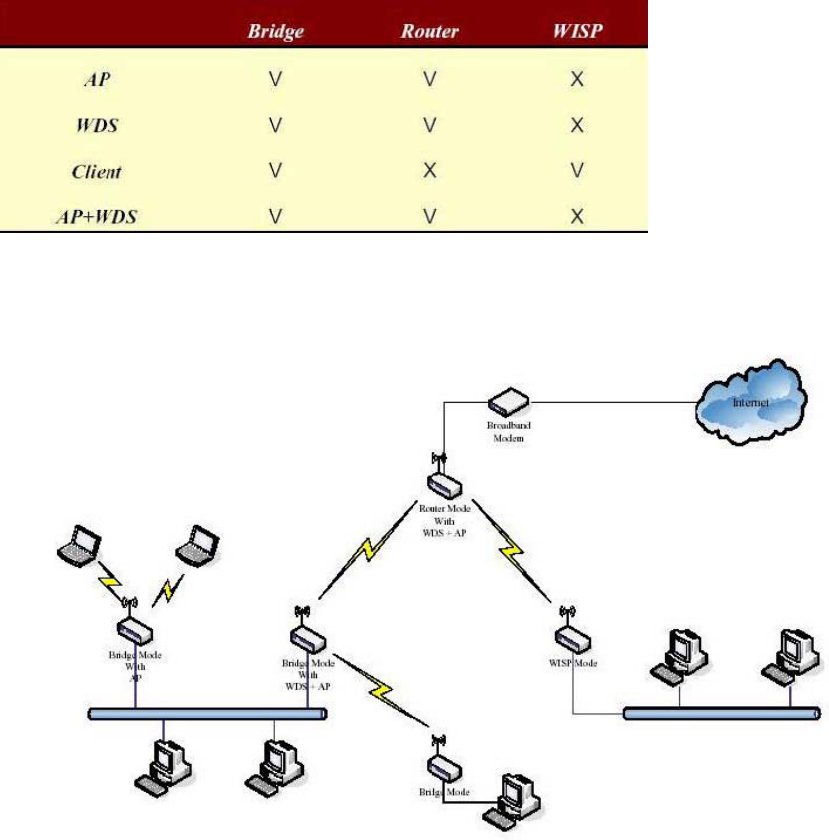
WDS (Wireless Distribution System)
This mode serves as a wireless repeater; the device forwards the packets to
another AP with WDS function. When this mode is selected, all the wireless
clients can’t survey and connect to the device. The device only allows the WDS
connection.
WDS+AP
This mode combines WDS plus AP modes, it not only allows WDS connections
but also the wireless clients can survey and connect to the device.
The following table shows the supporting combination of operation and wireless
radio modes.
Hereafter are some topologies of network application for your reference.
6
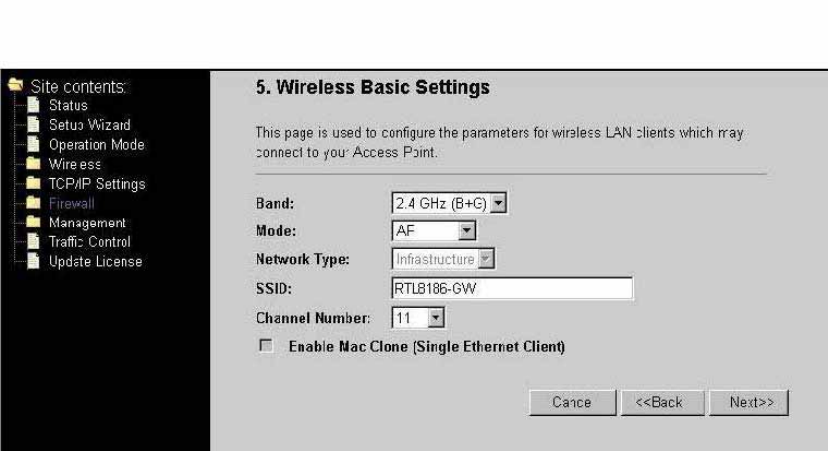
Basic Settings
Disable Wireless LAN Interface: Disable the
wireless interface of device Band: The device supports
2.4GHz(B), 2.4GHz(G) and 2.4GHz(B+G) mixed modes.
Mode: The radio of device supports different modes as following:
* AP : The radio of device acts as an Access Point to serves all wireless clients
to join a wireless local network.
* Client : Support Infrastructure and Ad-hoc network types to act as a wireless
adapter.
* WDS : Wireless Distribution System, this mode serves as a wireless repeater,
only devices with WDS function supported can connect to it, all the wireless
clients can’t survey and connect the device when the mode is selected.
* AP+WDS : Support both AP and WDS functions, the wireless clients and
devices with WDS function supported can survey and connect to it.
7
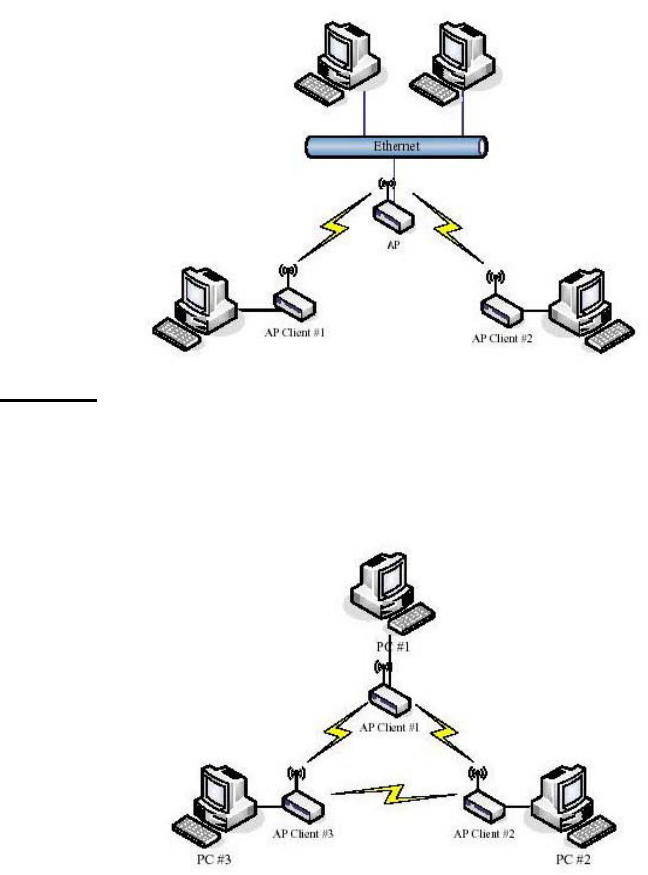
Infrastructure :
This type requires the presence of 802.11b/g Access Point. All communication is
done via the Access Point.
Ad Hoc : This type provides a peer-to-peer communication between
wireless stations. All the communication is done from Client to Client without
any Access Point involved. Ad Hoc networking must use the same SSID and
channel for establishing the wireless connection.
In client mode, the device can’t support the Router mode function including
Firewall and WAN settings.
8
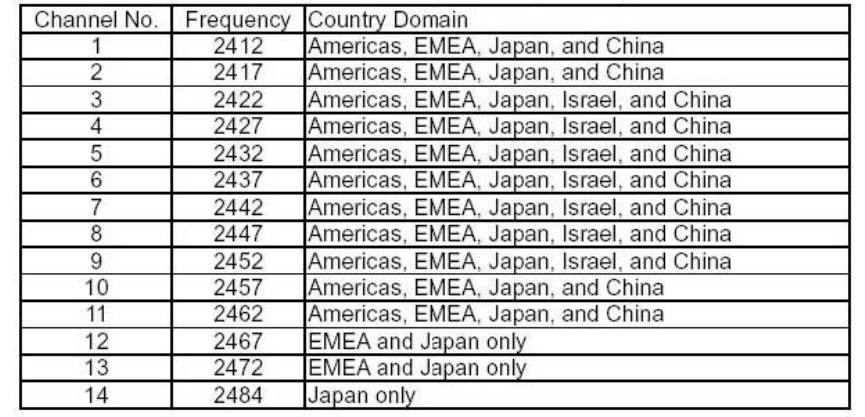
SSID :
The SSID is a unique identifier that wireless networking devices use to establish
and maintain wireless connectivity. Multiple access point/bridges on a network or
sub-network can use the same SSID. SSIDs are case sensitive and can contain
up to 32 alphanumeric characters. Do not include spaces in your SSID.
Channel Number :
The following table is the available frequencies (in MHz) for the 2.4-GHz radio:
When set to “Auto”, the device will find the least-congested channel for use.
Associated Client :
Show the information of active wireless client stations that connected to the
device.
9
Advanced Settings
Authentication Type
The device supports two Authentication Types “Open system” and “Shared Key”.
When you select “Share Key”, you need to setup “WEP” key in “Security” page
(See the next section). The default setting is “Auto”. The wireless client can
associate with the device by using one of the two types.
Fragment Threshold
The fragmentation threshold determines the size at which packets are
fragmented (sent as several pieces instead of as one block). Use a low setting in
areas where communication is poor or where there is a great deal of radio
interference. This function will help you to improve the network performance.
RTS Threshold
The RTS threshold determines the packet size at which the radio issues a
request to send (RTS) before sending the packet. A low RTS Threshold setting
can be useful in areas where many client devices are associating with the device,
or in areas where the clients are far apart and can detect only the device and not
each other. You can enter a setting ranging from 0 to 2347 bytes.
Data Rate
The standard IEEE 802.11b/11g supports 1, 2, 5.5, 11 / 6, 9, 12, 18, 24, 36, 48
and 54 Mbps data rates. You can choose the rate that the device uses for data
transmission. The default value is “auto”. The device will use the highest
possible selected transmission rate.
Beacon Interval
The beacon interval is the amount of time between access point beacons in
mini-seconds. The default beacon interval is 100.
Broadcast SSID
Broadcasting the SSID will let your wireless clients find the device automatically.
If you are building a public Wireless Network, disable this function can provide
better security. Every wireless stations located within the coverage of the device
must connect this device by manually configure the SSID in your client settings.
10
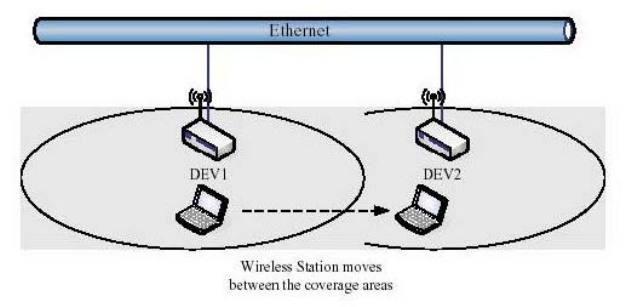
Int. Roaming
This function will let Wireless Stations roam among a network environment with
multiple devices. Wireless Stations are able to switch from one device to another
as they move between the coverage areas. Users can have more wireless
working range.
An example as the following figure.
You should comply with the following instructions to roam among the wireless
coverage areas.
Note : For implementing the roaming function, the setting MUST comply the following
two items.
All the devices must be in the same subnet network and the SSID must be the
same.
If you use the 802.1x authentication, you need to have the user profile in these
devices for the roaming station.
Block WLAN Relay (Isolate Client)
The device supports isolation function. If you are building a public Wireless
Network, enable this function can provide better security. The device will block
packets between wireless clients (relay). All the wireless clients connected to the
device can’t see each other.
11
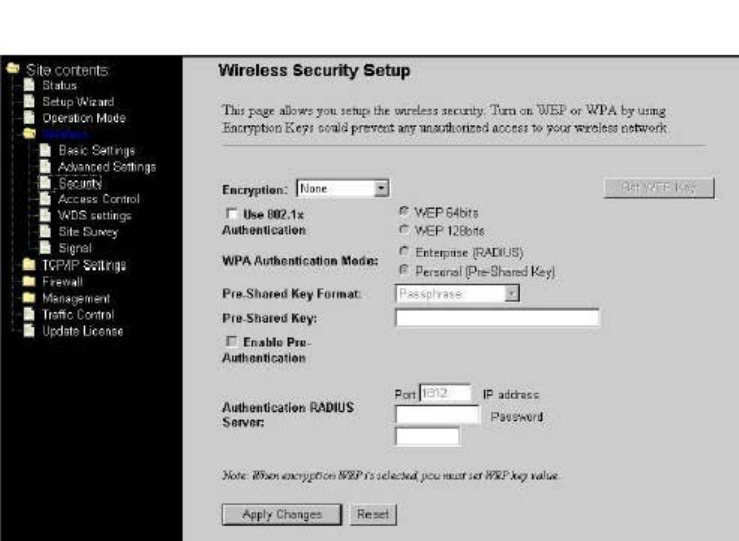
Configuring Wireless Security
This device provides complete wireless security function include WEP, 802.1x,
WPA-TKIP, WPA2-AES and WPA2-Mixed in different mode (see the Security
Support Table).
The default security setting of the encryption function is disabled. Choose your
preferred security setting depending on what security function you need.
WEP Encryption Setting
Wired Equivalent Privacy (WEP) is implemented in this device to prevent
unauthorized access to your wireless network. The WEP setting must be as
same as each client in your wireless network. For more secure data transmission,
you can change encryption type to “WEP” and click the “Set WEP Key” button to
open the “Wireless WEP Key setup” page.
12
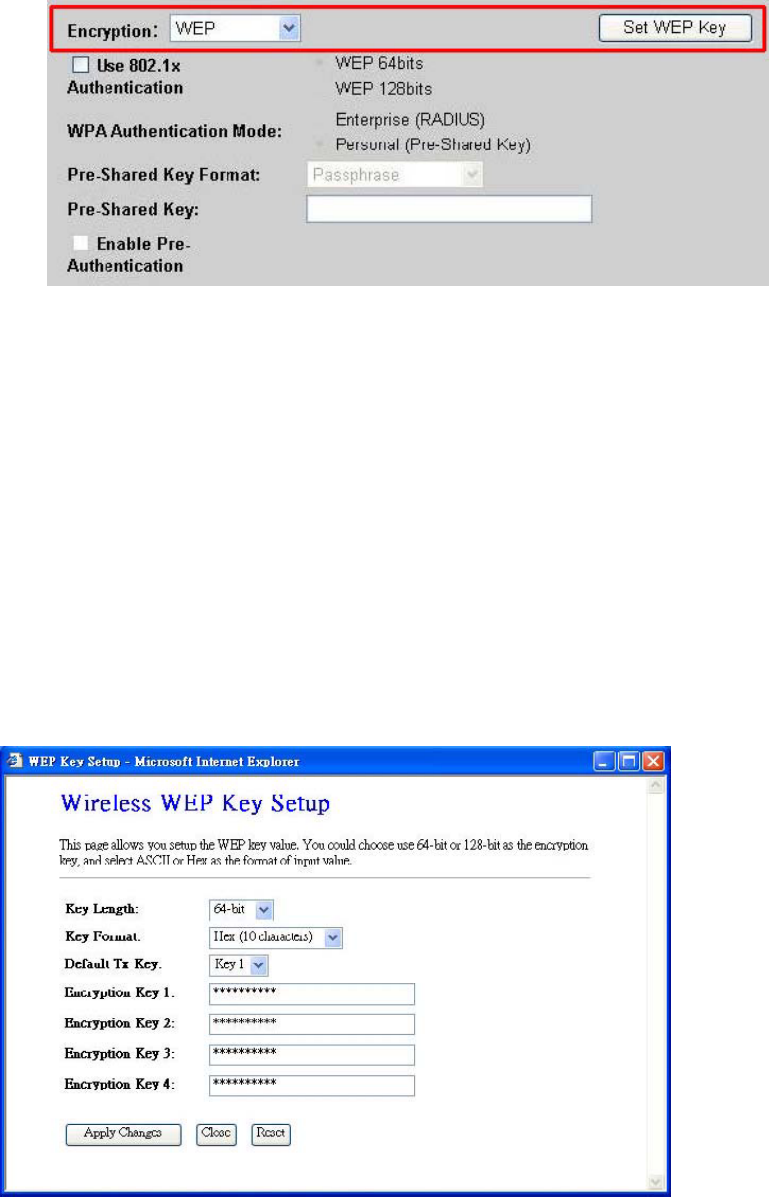
When you decide to use the WEP encryption to secure your WLAN, please refer
to the following setting of the WEP encryption:
64-bit WEP Encryption:64-bit WEP keys are as same as the
encryption method of 40-bit WEP. You can input 10 hexadecimal
digits (0~9, a~f or A~F) or 5 ACSII chars.
128-bit WEP Encryption:128-bit WEP keys are as same as the encryption
method of 104-bit WEP. You can input 26 hexadecimal digits (0~9, a~f or A~F) or
10 ACSII chars.
The Default Tx Key field decides which of the four keys you want to use in your
WLAN environment.
13
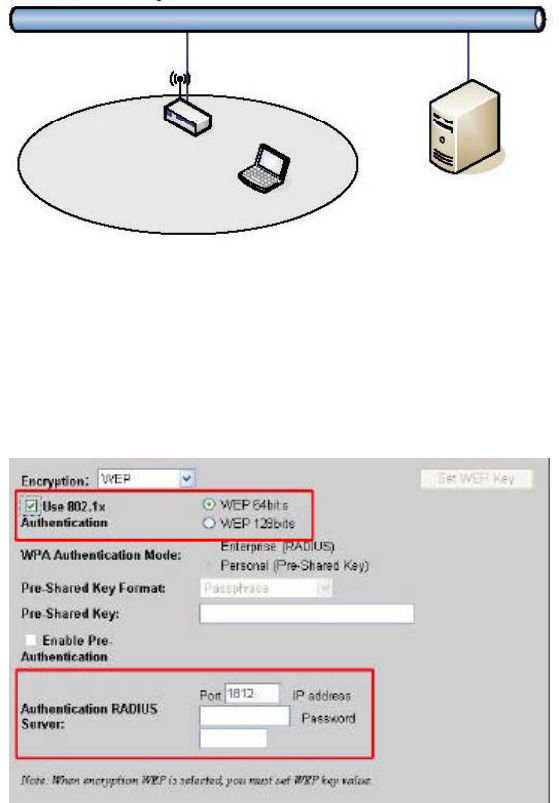
WEP Encryption with 802.1x Setting
The device supports external RADIUS Server that can secure networks against
unauthorized access. If you use the WEP encryption, you can also use the
RADIUS server to check the admission of the users. By this way every user must
use a valid account before accessing the Wireless LAN and requires a RADIUS
or other authentication server on the network. An example is shown as following.
You should choose WEP 64 or 128 bit encryption to fit with your network
environment first. Then add user accounts and the target device to the RADIUS
server. In the device , you need to specify the IP address、Password (Shared
Secret) and Port number of the target RADIUS server.
14
WPA Encryption Setting
WPA feature provides a high level of assurance for end-users and
administrators that their data will remain private and access to their
network restricted to authorized users. You can choose the WPA
encryption and select the Authentication Mode.
WPA Authentication Mode
This device supports two WPA modes. For personal user, you can use
the Pre-shared Key to enhance your security setting. This mode requires
only an access point and client station that supports WPA-PSK. For
Enterprise, authentication is achieved via WPA RADIUS Server. You
need a RADIUS or other authentication server on the network.
Enterprise (RADIUS):
When WPA Authentication mode is Enterprise (RADIUS), you have to add user
accounts and the
target device to the RADIUS Server. In the device , you need to specify the IP
address、Password
(Shared Secret) and Port number of the target RADIUS server.
Pre-Share Key:
This mode requires only an access point and client station that supports
WPA-PSK. The WPA-PSK settings include Key Format, Length and Value. They
must be as same as each wireless client in your wireless network. When Key
format is Passphrase, the key value should have 8~63 ACSII chars. When Key
format is Hex, the key value should have 64 hexadecimal digits (0~9, a~f or
A~F).
15
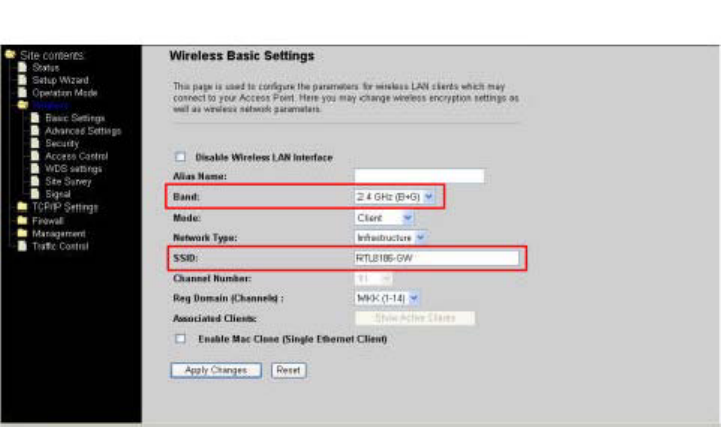
Configuring as WLAN Client Adapter
This device can be configured as a wireless Ethernet adapter. In this mode, the
device can connect to the other wireless stations (Ad-Hoc network type) or
Access Point (Infrastructure network type) and you don’t need to install any
driver.
Quick start to configure
Step 1. In “Basic Settings” page, change the Mode to “Client” mode. And key in
the SSID of the AP you want to connect then press “Apply Changes”
button to apply the change.
16
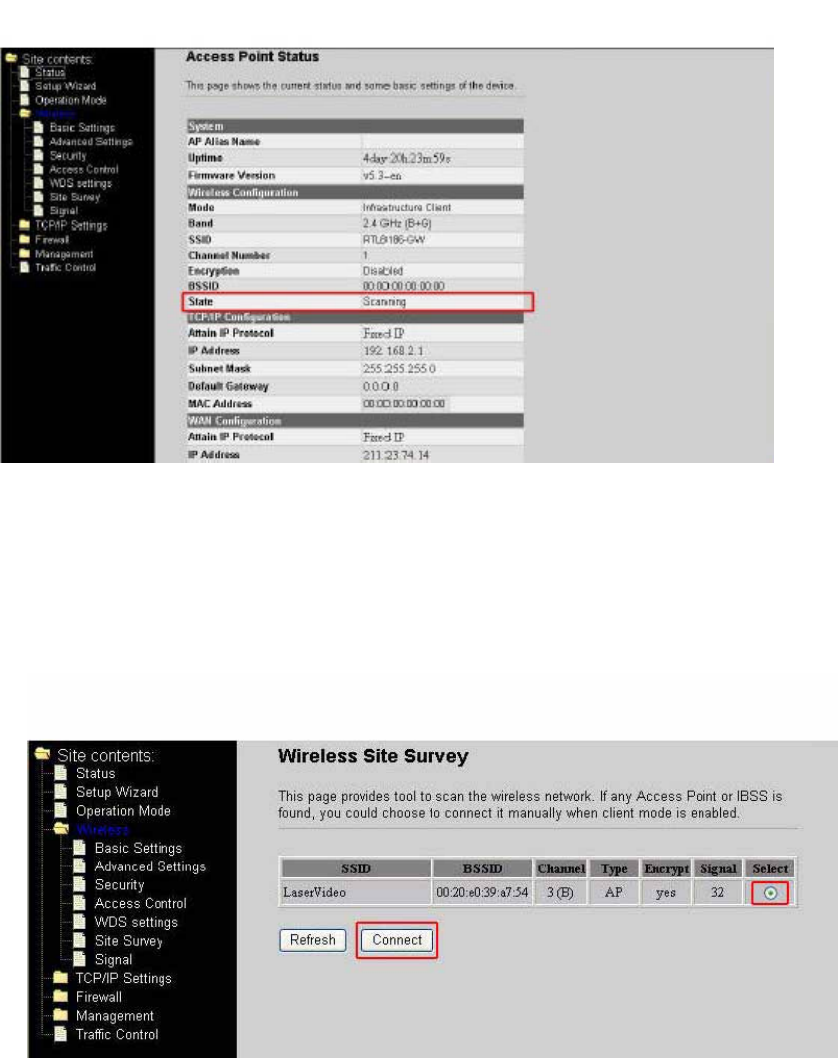
Step 2. Check the status of connection in “Status” web page
The alternative way to configure as following:
Step 1. In “Wireless Site Survey” page, select one of the SSIDs you want to
connect and then press “Connect” button to establish the link.
17
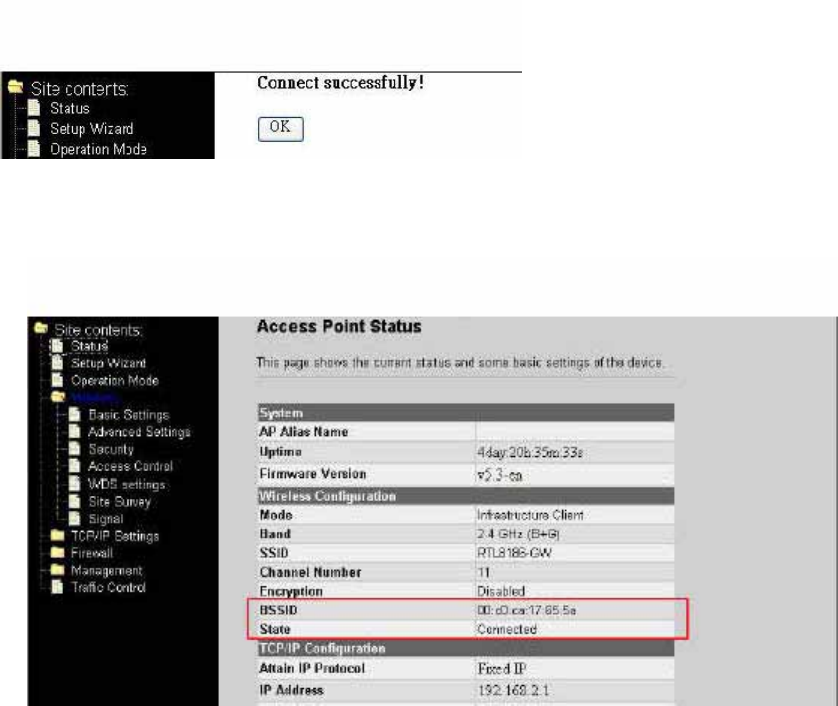
Step 2. If the linking is established successfully. It will show the message ”Connect
successfully”. Then press “OK”.
Step 3. Then you can check the linking information in “Status” page.
Note: If the available network requires authentication and data encryption, you
need to setup the authentication and encryption before step1 and all the settings
must be as same as the Access Point or Station. About the detail authentication
and data encryption settings, please refer the security section.
18
Authentication Type
In client mode, the device also supports two Authentication Types “Open system”
and “Shared Key”. Although the default setting is “Auto”, not every Access Points
can support “Auto” mode. If the authentication type on the Access Point is knew
by user, we suggest to set the authentication type as same as the Access Point.
Data Encryption
In client mode, the device supports WEP and WPA Personal/Enterprise
except WPA2 mixed mode data encryption. About the detail data
encryption settings, please refer the security section.
19
Ch 3. Configuring WDS
Wireless Distribution System (WDS) uses wireless media to communicate with
the other devices, like the Ethernet does. This function allows one or more
remote LANs connect with the local LAN. To do this, you must set these devices
in the same channel and set MAC address of other devices you want to
communicate with in the WDS AP List and then enable the WDS.
When you decide to use the WDS to extend your WLAN, please refer the
following instructions for configuration.
1. The bridging devices by WDS must use the same radio channel.
2. When the WDS function is enabled, all wireless stations can’t connect the
device.
3. If your network topology has a loop, you need to enable the 802.1d Spanning
Tree function.
4. You don’t need to add all MAC address of devices existed in your network to
WDS AP List. WDS AP List only needs to specify the MAC address of devices
you need to directly connect to.
5. The bandwidth of device is limited, to add more bridging devices will split the
more bandwidth to every bridging device.
WDS network topology
In this section, we will demonstrate the WDS network topologies and WDS AP
List configuration. You can setup the four kinds of network topologies: bus, star,
ring and mesh.
In this case, there are five devices with WDS enabled: WDS1, WDS2, WDS3,
WDS4 and WDS5.
20
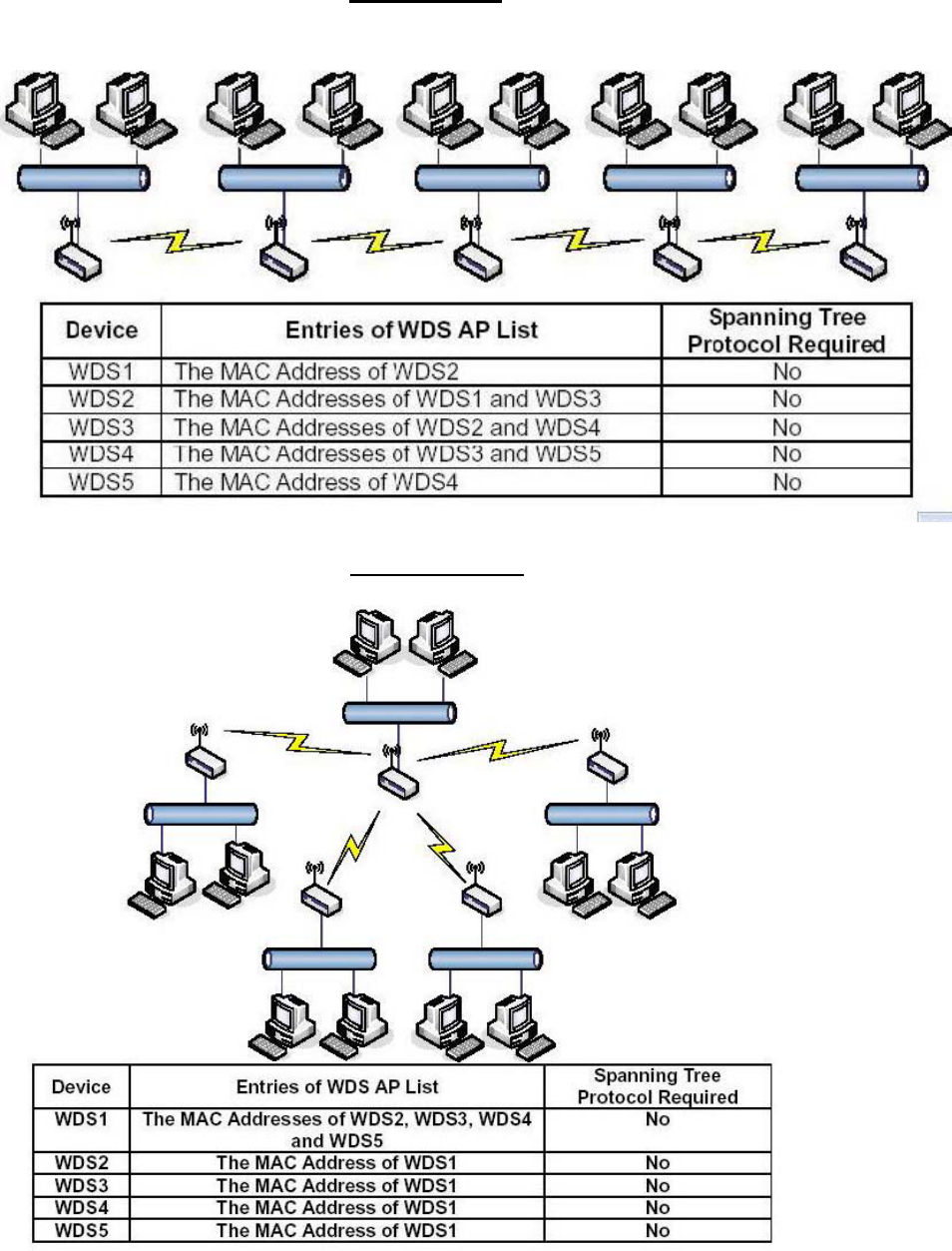
Bus topology:
Star topology:
21
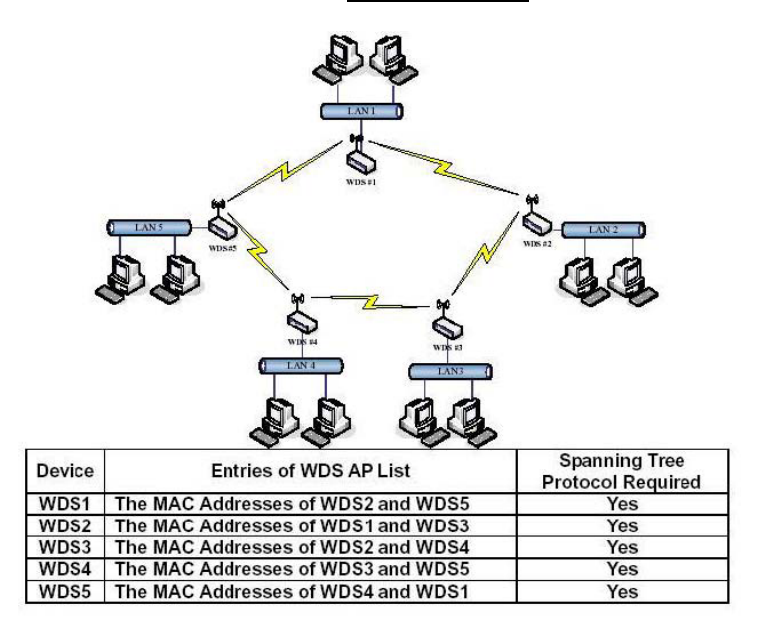
Ring topology:
22
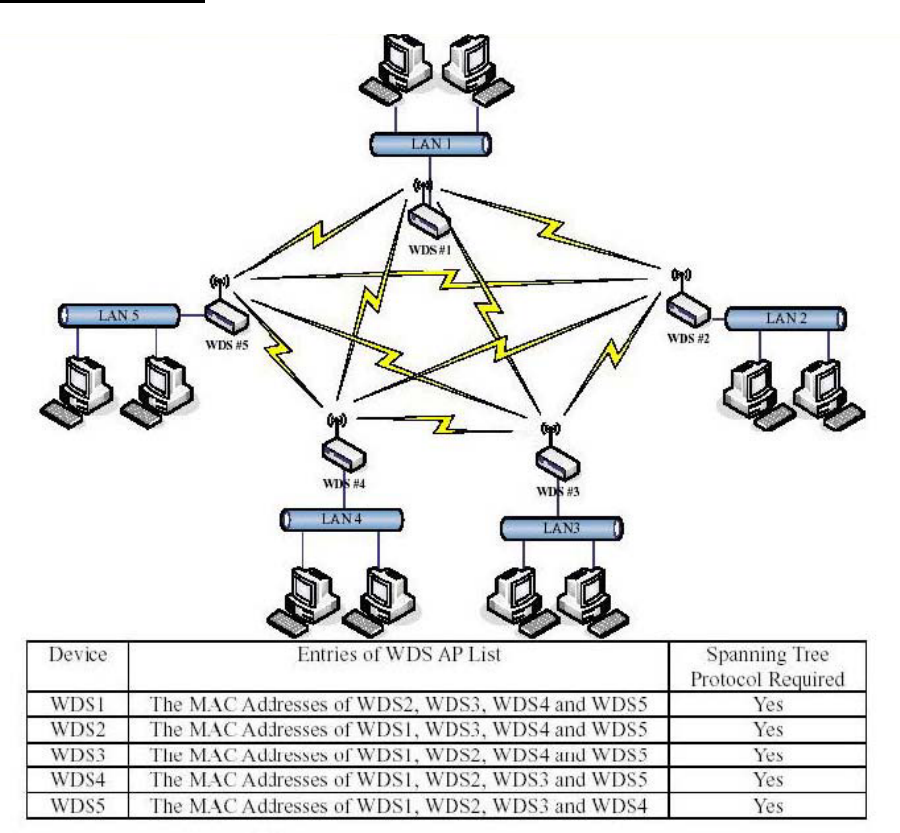
Mesh topology:
23
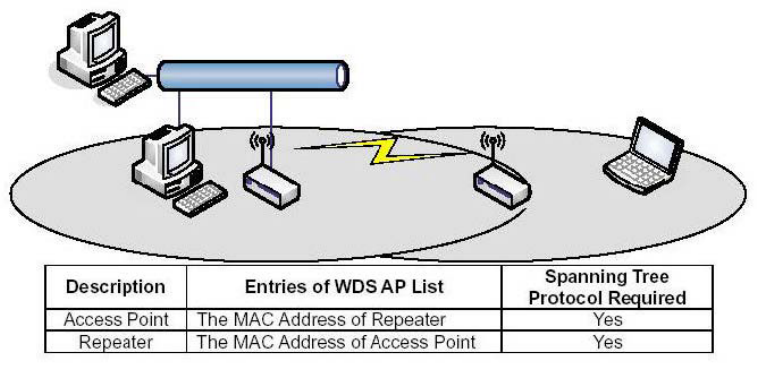
WDS Application
Wireless Repeater
Wireless Repeater can be used to increase the coverage area of another device
(Parent AP). Between the Parent AP and the Wireless Repeater, wireless
stations can move among the coverage areas of both devices. When you decide
to use the WDS as a Repeater, please refer the following instructions for
configuration.
※ In AP mode, enable the WDS function.
※ You must set these connected devices with the same radio channel and
SSID.
※ Choose “WDS+AP” mode.
※ Using the bus or star network topology.
Wireless Bridge
Wireless Bridge can establish a wireless connection between two or more Wired
LANs. When you
decide to use the WDS as a Wireless Bridge, please refer the following
instructions for configuration.
24
* In AP mode, enable the WDS function.
* You must set these connected devices with the same radio channel, but you
may use different SSID.
* Choose “WDS” mode for only wireless backbone extension purpose.
* You can use any network topology, please refer the WDS topology section.
25
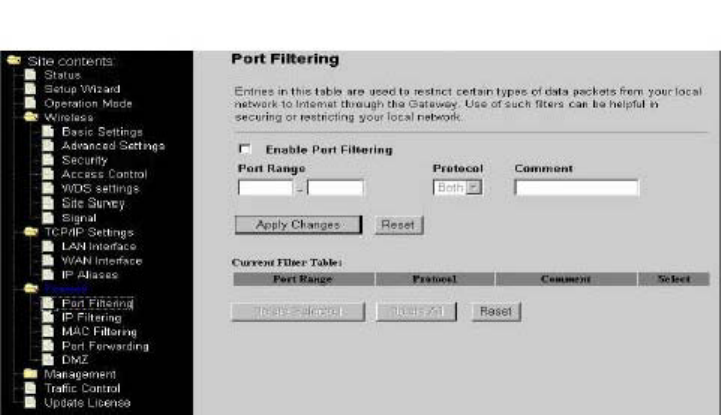
Ch 4. Advanced Configurations
Configuring LAN to WAN
Firewall
Filtering function is used to block packets from LAN to WAN. The device
supports three kinds of filter Port Filtering, IP Filtering and MAC Filtering. All the
entries in current filter table are used to restrict certain types of packets from your
local network to through the device. Use of such filters can be helpful in securing
or restricting your local network.
Port Filtering
When you enable the Port Filtering function, you can specify a single port or port
ranges in current filter table. Once the source port of outgoing packets match the
port definition or within the port ranges in the table, the firewall will block those
packets from LAN to WAN.
26
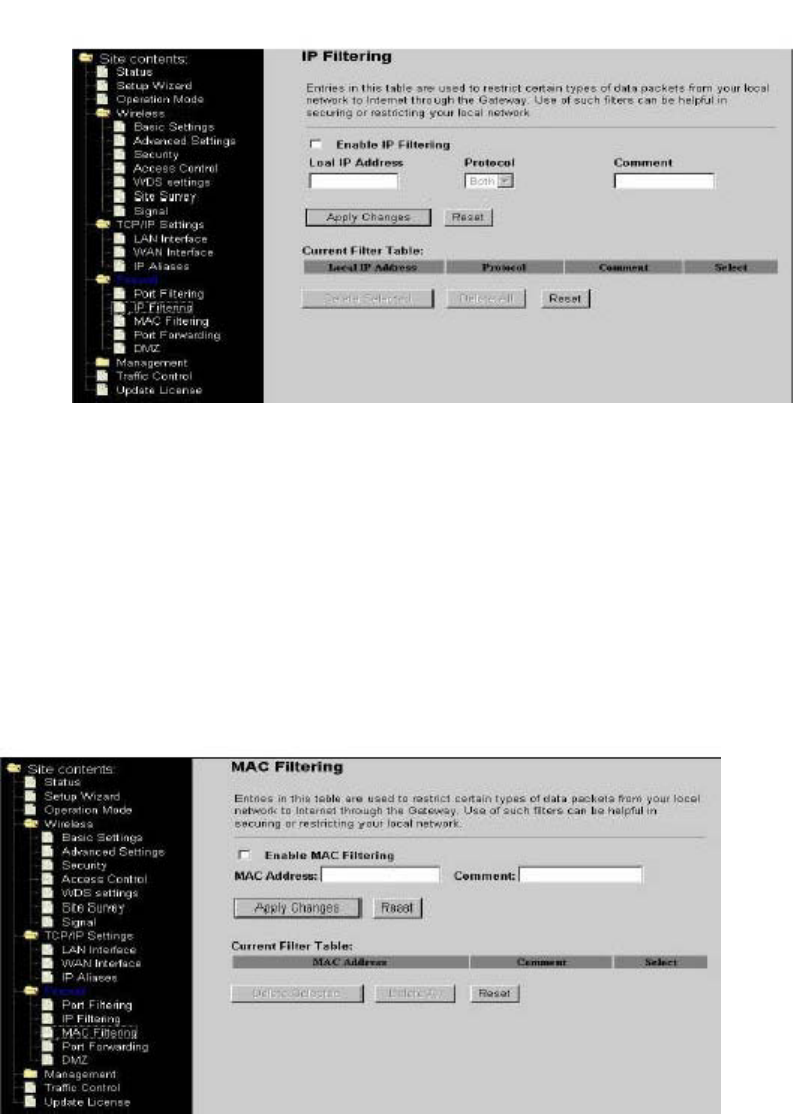
IP Filtering
When you enable the IP Filtering function, you can specify local IP Addresses in
current filter table. Once the source IP address of outgoing packets match the IP
Addresses in the table, the firewall will block this packet from LAN to WAN.
MAC Filtering
When you enable the MAC Filtering function, you can specify the MAC
Addresses in current filter table.
Once the source MAC Address of outgoing packets match the MAC Addresses in
the table,
the firewall will block this packet from LAN to WAN.
27
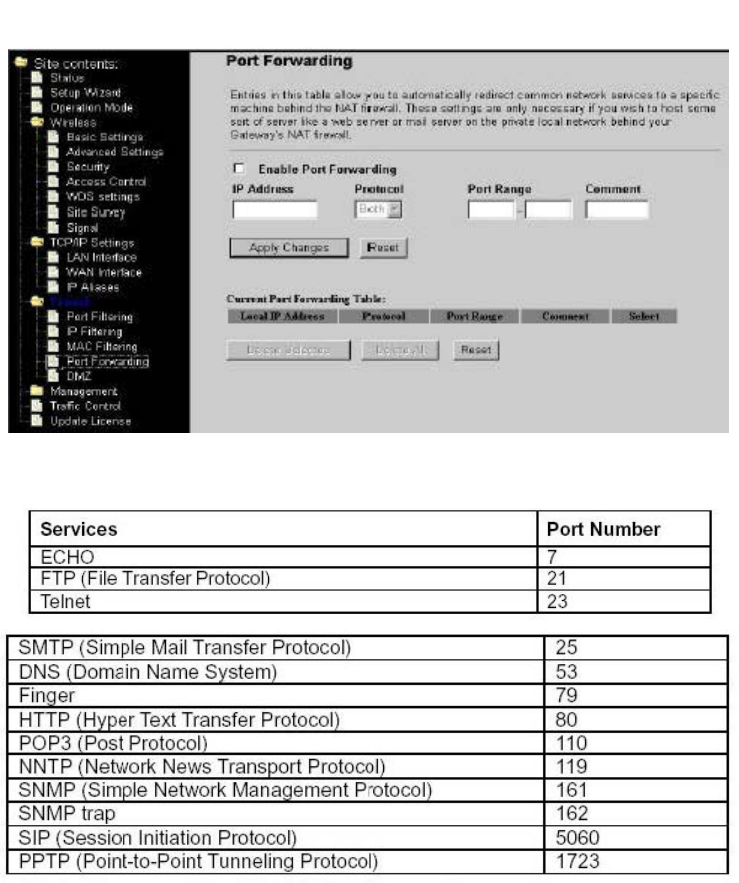
Configuring Port Forwarding (Virtual
Server)
This function allows you to automatically redirect common network services to a
specific machine behind the NAT firewall. These settings are only necessary if
you wish to host some sort of server like a web server or mail server on the
private local network behind the device's NAT firewall.
The most often used port numbers are shown in the following table.
28
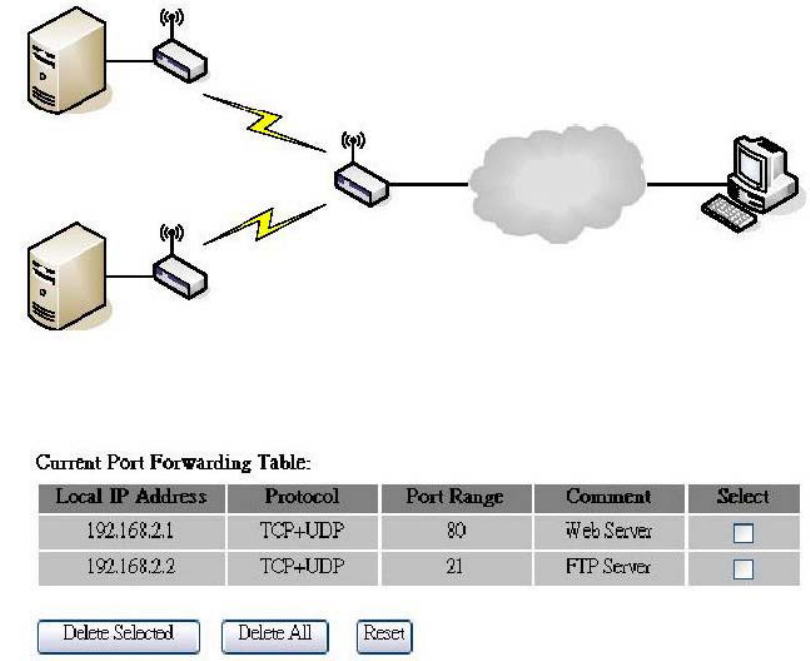
Multiple Servers behind NAT Example:
In this case, there are two PCs in the local network accessible for outside users.
Configuring DMZ
A Demilitarized Zone is used to provide Internet services without sacrificing
unauthorized access to its local private network. Typically, the DMZ host contains
devices accessible to Internet traffic, such as Web (HTTP) servers, FTP servers,
SMTP (e-mail) servers and DNS servers. So that all inbound packets will be
redirected to the computer you set. It also is useful while you run some
applications (ex. Internet game) that use uncertain incoming ports.
29
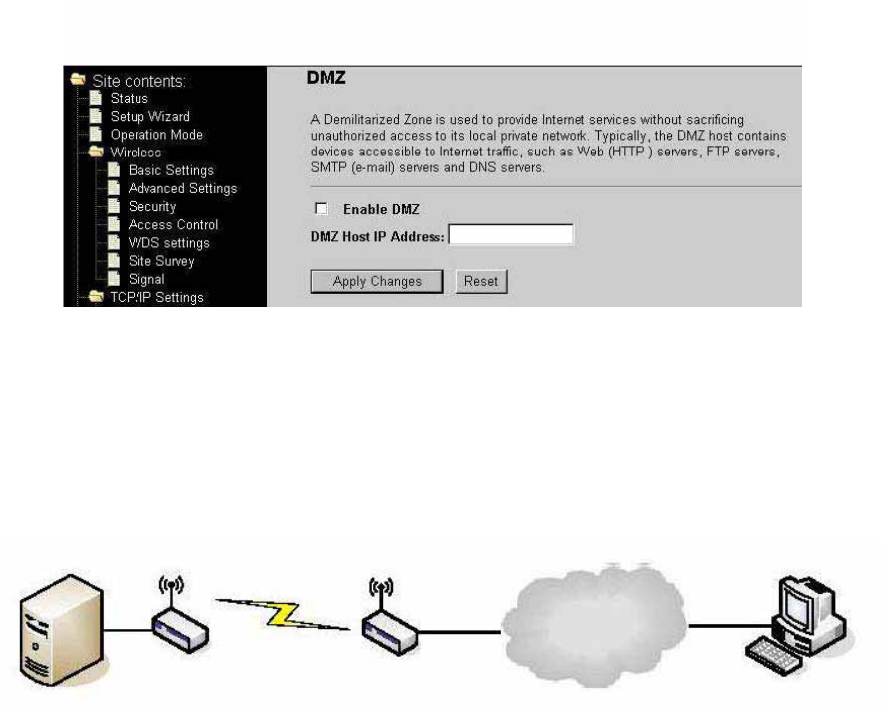
Enable DMZ: Enable the “Enable DMZ”, and then click “Apply Changes” button
to save the changes. DMZ Host IP Address: Input the IP Address of the
computer that you want to expose to Internet.
30
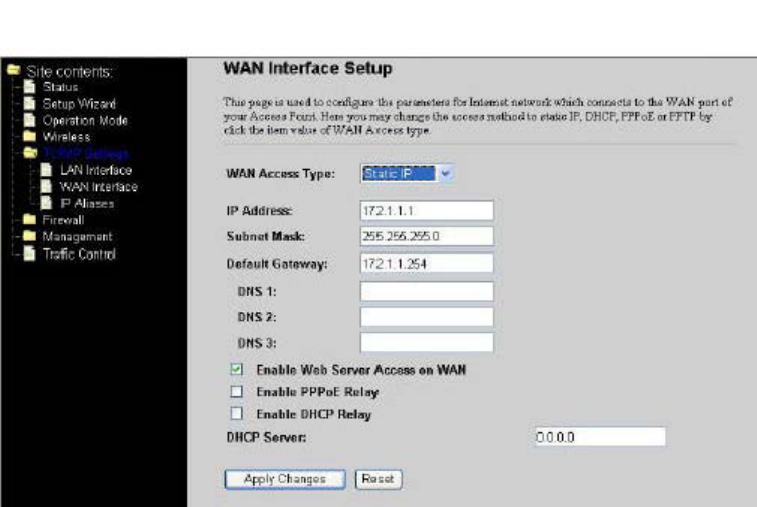
Configuring WAN Interface
The device supports four kinds of IP configuration for WAN interface, including
Static IP, DHCP Client, PPPoE and PPTP. You can select one of the WAN
Access Types depend on your ISP required. The default WAN Access Type is
“Static IP”.
Static IP
You can get the IP configuration data of Static-IP from your ISP. And you will
need to fill the fields of IP address, subnet mask, gateway address, and one of
the DNS addresses.
31
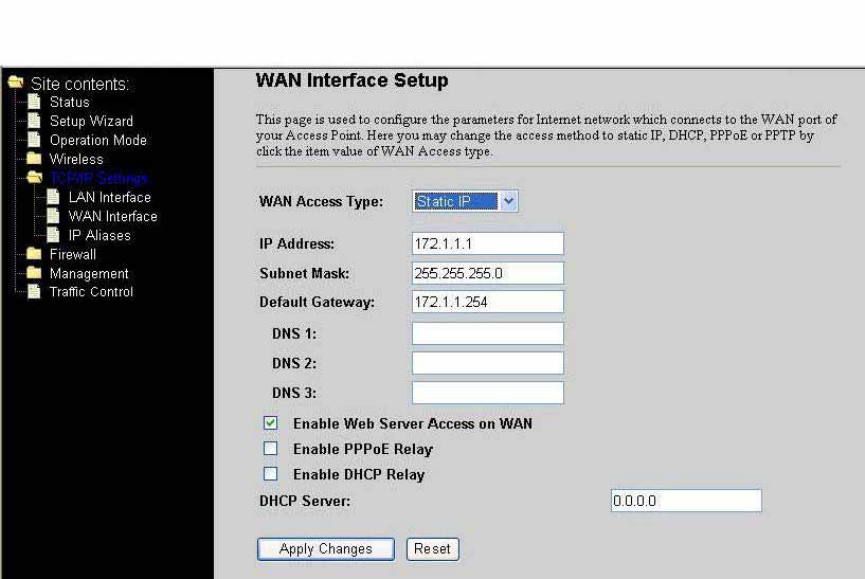
IP Address: The Internet Protocol (IP) address of WAN interface provided by
your ISP or MIS. The
address will be your network identifier besides your local
network.
Subnet
Mask: The number used to identify the IP subnet network, indicating
whether the IP address can be
recognized on the LAN or if it must be reached hrough a
gateway.
Default Gateway: The IP address of Default Gateway provided by your ISP or
MIS. Default Gateway is the intermediate network device that has knowledge of
the network IDs of the other networks in the Wide Area Network, so it can
forward the packets to other gateways until they are delivered to the one
connected to the specified destination.
DNS 1~3: The IP addresses of DNS provided by your ISP. DNS (Domain Name
Server) is used to map domain names to IP addresses. DNS maintain central
lists of domain name/IP addresses and map the domain names in your Internet
requests to other servers on the Internet until the specified web site is found.
32
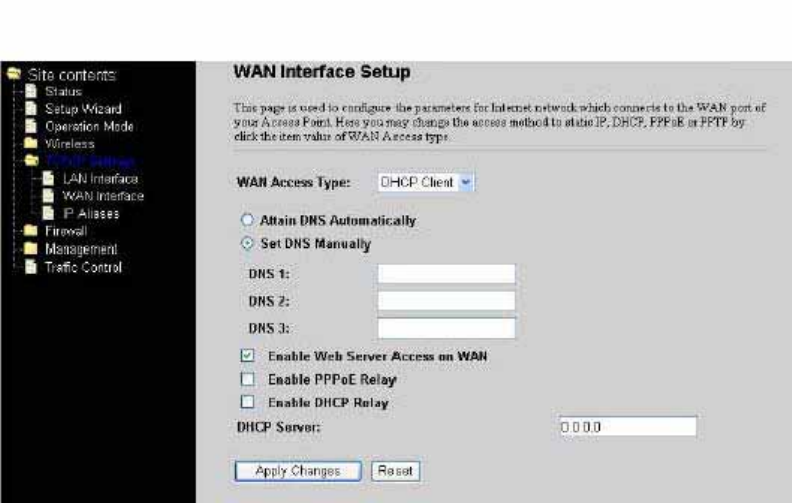
DHCP Client (Dynamic IP)
All IP configuration data besides DNS will obtain from the DHCP server when
DHCP-Client WAN Access Type is selected.
DNS1~3: The IP addresses of DNS provided by your ISP.
DNS (Domain Name Server) is used to map domain names to IP addresses.
DNS maintain central lists of domain name/IP addresses and map the domain
names in your Internet requests to other servers on the Internet until the
specified web site is found.
33
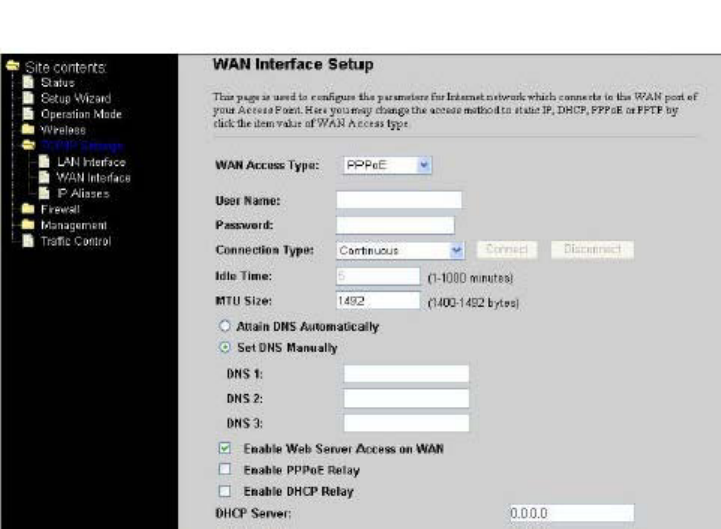
PPPoE
When the PPPoE (Point to Point Protocol over Ethernet) WAN Access Type is
selected, you must fill the fields of User Name, Password provided by your ISP.
The IP configuration will be done when the device successfully authenticates with
your ISP.
User Name: The account provided by your ISP
Password: The password for your account.
Connect Type: “Continuous “ : connect to ISP permanently ”Manual” : Manual
connect/disconnect to
34
ISP ”On-Demand” : Automatically connect to ISP when user need to access
the Internet.
Idle Time: The number of inactivity minutes to disconnect from ISP. This
setting is only available when “Connect on Demand” connection
type is selected.
MTU Size: Maximum Transmission Unit, 1412 is the default setting, you
may need to change the MTU for optimal performance with your
specific ISP.
DNS1~3: The IP addresses of DNS provided by your ISP.
DNS (Domain Name Server) is used to map domain names to IP
addresses. DNS maintain central lists of domain name/IP
addresses and map the domain names in your Internet requests
to other servers on the Internet until the specified web site is
found.
35
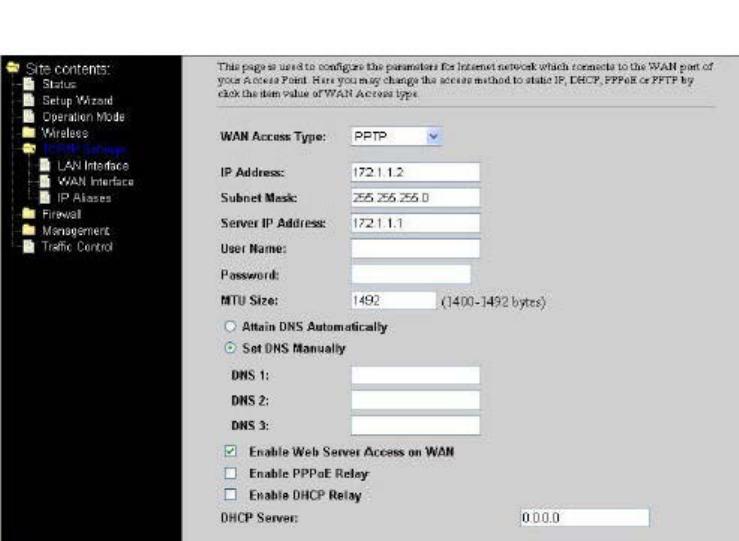
PPTP
Point to Point Tunneling Protocol (PPTP) is a service that applies to connections
in Europe only.
IP Address: The Internet Protocol (IP) address of WAN interface provided by
your ISP or MIS. The address will be your network identifier besides your local
network.
Subnet Mask: The number used to identify the IP subnet network, indicating
whether the IP address can be recognized on the LAN or if it must be reached
through a gateway.
Server IP Address: The IP address of PPTP server (Default Gateway)
User Name: The account provided by your ISP
Password: The password of your account
MTU Size: Maximum Transmission Unit, 1412 is the default setting, you may
need to change the MTU for optimal performance with your specific ISP.
DNS1~3: The IP addresses of DNS provided by your ISP. DNS (Domain Name
Server) is used to map domain names to IP addresses. DNS maintain central
lists of domain name/IP addresses and map the domain names in your Internet
requests to other servers on the Internet until the specified web site is found.
36
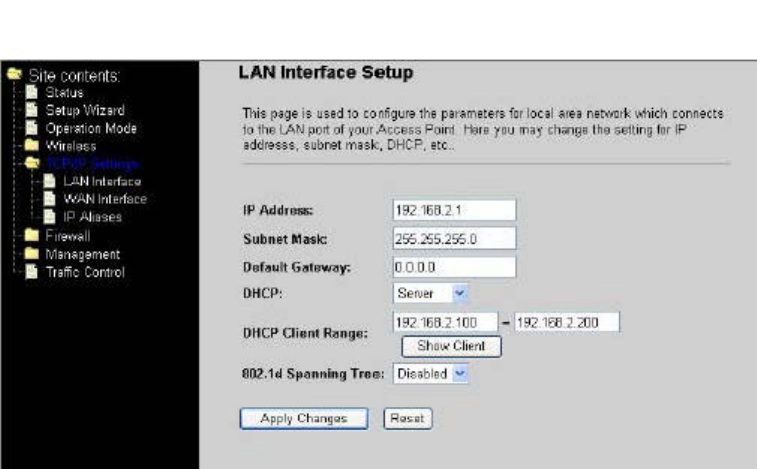
Configuring DHCP Server
1. To use the DHCP server inside the device, please make sure there is no other
DHCP server existed in the same network as the device.
2. Enable the DHCP Server option and assign the client range of IP addresses
as following page.
3. When the DHCP server is enabled and also the device router mode is enabled
then the default gateway for all the DHCP client hosts will set to the IP address
of device.
Traffic Control
This functionality can control Traffic of Up/Downstream
1. Enable Traffic Control and then enter LAN output Rate 、WAN output Rate in
37
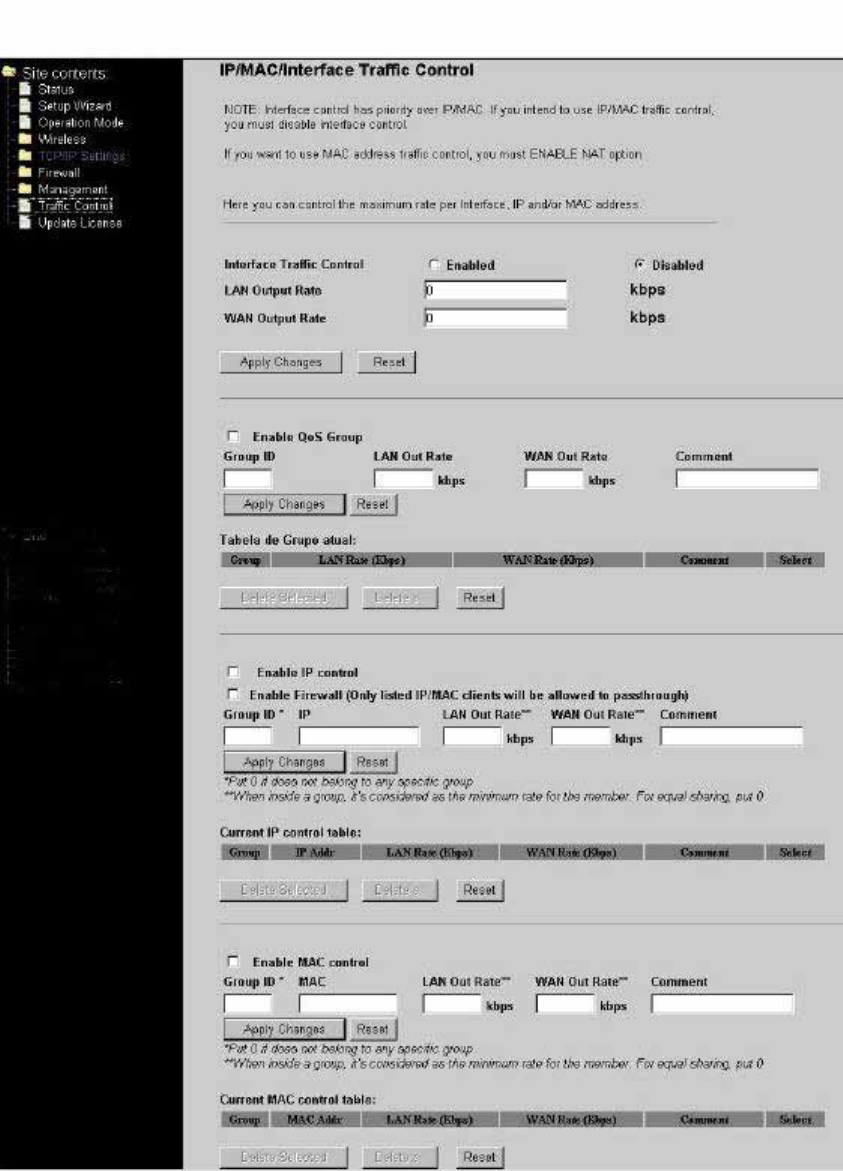
the specific field. It can control maximum rate by interface, IP and MAC
address
38
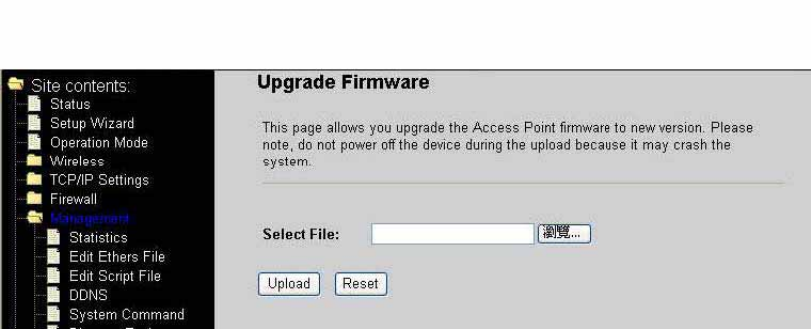
Firmware Upgrade
Upgrading Firmware The Web-Browser upgrading interface is the simplest
and safest way for user, it will check the firmware checksum and signature,
and the wrong firmware won’t be accepted. After upgrading, the device will
reboot and please note that depends on the version of firmware, the
upgrading may cause the device configuration to be restored to the factory
default setting, and the original configuration data will be lost! To upgrade
firmware, just assign the file name with full path then click ” Upload” button as
the following page.
Memory Limitation To make sure the device have enough memory to upload
firmware, the system will check the capacity of free memory, if the device
lack of memory to upload firmware, please temporarily turn-off some
functions then reboot the device to get enough memory for firmware
uploading.
Configuration Data Backup & Restore
Rest Setting to Factory Default Value Since the device is designed for outdoor
used, there is no interface outside the housing to reset the configuration value to
the factory default value. The device provides the Web-Browser interface to rest
the configuration data. After resetting it, the current configuration data will be lost
and restored to factory default value.
39
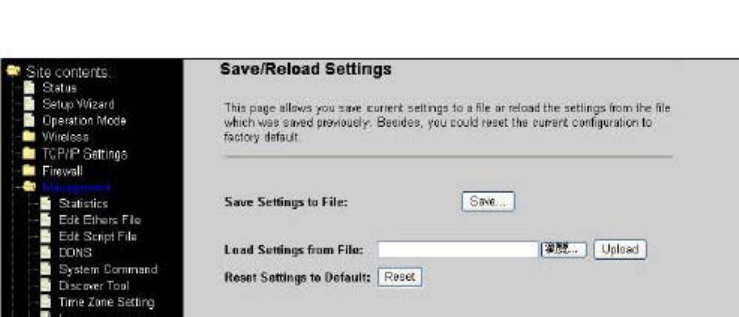
Saving & Restoring Configuration Data To save & restore configuration
data of device, just assign the target filename with full path at your local host,
then you can backup configuration data to local host or restore configuration data
to the device.
40
HOW To List for all detail control and script
※ HOW TO USE BANDWIDTH CONTROL
NOTE: This control uses QoS with HTB.
Bandwidth control it's done through Traffic Control menu, via web interface or via
/etc/cbu.conf file. You can limit all traffic via Interface control or you can control
via IP and/or MAC basis. Further more, you can create QoS groups and share
the group rate amoung the members of that group. You can as well, guarantee
minimum rate for group member.
Ex:
CASE 1:
You are going to install this equipment for a Wireless ISP client, which has
maximum 256 kbit download speed and 128 kbit upload. Go to traffic control
menu and enable "Interface traffic control", with the values:
LAN Output rate: 256 -> LAN control downloads
WAN Output rate: 128 -> WAN control uploads
With interface based traffic control, you can control maximum interface speed,
regardless NAT function enabled or not.
CASE 2:
You are going to install this equipment for an inn establishment, which have 3
clients. Each client wants to have their own speed rate.
With this scenario, you can control them via IP or MAC address. To do it so,
enable you desired option ( IP/MAC control ) and put your client's IP/MAC
address. One entry for each client. This way, you will limit desired speed for each
individual client. Further more, you can activate firewall option to block any other
machine not listed.
To use IP/MAC control, you must disable interface traffic control.
41
※ HOW TO USE BANDWIDTH CONTROL WITH QoS GROUP OPTION
QoS groups are used to limit a group of users, and share the total rate. The idea
here is simple:
ٛ - Any member of the group can reach the total rate of the group
ٛ - The total sum of all member's traffic together, will not exceed the total
rate of the group
ٛ - Any member of the group can have guaranteed bandwidht
-Equal bandwidth sharing
Ex:
Let's back to our example above. Inn establishment, which have 3 clients. All
clients have 256 kbit speed contract. One of the clients has 2 machines, which
he likes to use internet on both. How to solve this case, if he has 256 kbit speed
and two machines? Simple. Let's enable QoS group option.
Go to traffic control and enable QoS group option. Create a group as follow:
Group ID: 1
LAN Out rate: 256 -> Total rate for download
WAN Out rate: 256 -> Total rate for upload
Next thing to do is to put the two machines of that client inside the group ( via IP
or MAC control ), as follow:
Group ID: 1 -> Member of QoS group ID 1
IP: 192.168.x.x -> machine's 1 IP
LAN Out rate: 0 -> 0 for equal sharing
WAN Out rate: 0 -> 0 for equal sharing
Group ID: 1 -> Member of QoS group ID 1
IP: 192.168.x.x -> machine's 2 IP
LAN Out rate: 0 -> 0 for equal sharing
WAN Out rate: 0 -> 0 for equal sharing
This is the example for equal sharing between those 2 machines. Now, let's
suppose that, this client wants to have at least 200 kbit guaranteed to machine 1.
Simple to do it, as follow:
Group ID: 1 -> Member of QoS group ID 1
42
IP: 192.168.x.x -> machine's 1 IP
LAN Out rate: 200 -> 200 kbit guaranteed
WAN Out rate: 200 -> 200 kbit guaranteed
Group ID: 1 -> Member of QoS group ID 1
IP: 192.168.x.x -> machine's 2 IP
LAN Out rate: 0
WAN Out rate: 0
The other 2 clients, will have no group:
Group ID: 0 -> Does not belong to any group
IP: 192.168.x.x -> Client 2
LAN Out rate: 256
WAN Out rate: 256
Group ID: 0 -> Does not belong to any
group
IP: 192.168.x.x -> Client 3
LAN Out rate: 256
WAN Out rate: 256
43
※ HOW TO GUARANTEE BANDWIDTH FOR A VOIP SYSTEM
We will use this example to show how easy is to guarantee bandwidth for a voip
system for instance. The main objective here is, to set up simple scenario with no
effort. The scenario is:
-Internet connection of 300 kbit
ٛ - Guarantee 64 kbit for Voip machine
ٛ - Don't need to enter every single machine as group member
You are going to install this equipment, for some company which has a voip
system and some small network (let's say, 30 computers ). We want that all
machines have internet access.
Let's set up our QoS group:
Group ID: 1
LAN Out rate: 300 -> Internet Total download rate
WAN Out rate: 300 -> Internet Total upload rate Now, the first thing to
do is to put our voip machine in first place:
Group ID: 1 -> Member of QoS group ID 1
IP: 192.168.x.x -> Voip machine IP address
LAN Out rate: 64 -> 64 kbit guaranteed
WAN Out rate: 64 -> 64 kbit guaranteed
Next, instead of put every single machine inside the control list, we will put this
rule:
Group ID: 1 IP: 0.0.0.0 LAN Out rate: 0 WAN Out rate: 0
Simple as that.
How dos it work?
-> Member of QoS group ID 1 -> 0.0.0.0= the entire network
When there is no VOIP traffic, the entire network can reach 300 kbit internet
connection. As soon as the voip system starts to operate, the QoS system will
reserve 64 kbit for the voip.
44
But, if the boss machine wants to have 128 kbit guaranteed as well? Proceed as
follow:
Group ID: 1 LAN Out rate: 300 WAN Out rate: 300
Group ID: 1 IP: 192.168.x.x LAN Out rate: 64 WAN Out rate: 64
Group ID: 1 IP: 192.168.x.x LAN Out rate: 128 WAN Out rate: 128
Group ID: 1 IP: 0.0.0.0 LAN Out rate: 0 -> Internet Total download rate ->
Internet Total upload rate
-> Member of QoS group ID 1
-> Voip machine IP address -> 64 kbit guaranteed -> 64 kbit guaranteed
-> Member of QoS group ID 1
-> Boss ip address -> 128 kbit guaranteed -> 128 kbit guaranteed
-> Member of QoS group ID 1
-> 0.0.0.0= the entire network WAN Out rate: 0
And so on. We can guarantee as many machines as we want. The rest, will
share.
45
※ TRAFFIC CONTROL VIA CONFIG FILE INSTEAD OF WEB INTERFACE
This version allows unlimited IP or MAC address traffic control, via /etc/cbu.conf
file. Via WEB interface you can only control up to 40 entries. The file etc/cbu.conf
uses the same idea as via WEB interface. After you’re done with file changes,
you have to type the following commands in order, to save and activate the
changes:
# salvar
# /bin/cbu.sh
# /bin/firewall.sh
NOTE: REMEMBER TO ACTIVATE TRAFFIC CONTROL VIA WEB INTERFACE.
46
※ NOTES ABOUT SSH ACCESS
This firmware version comes with SSH2 server. As default, we have the user
"root" with password "root".
To change the root's password, proceed as follow:
- Access the equipment through SSH terminal ( putty for example )
-type: "passwd"
-Type your new password and confirm
- Now, to permanet save the change, type: "salvar" - save in portuguese :)
This version comes with SSH client program. You can use it to remotelly connect
to another equipment.
※ FREEDOM TO CHANGE/EDIT PERSONAL SCRIPT VIA WEB
Go to menu Management -> Edit Script File. You can change the way you want.
After that, just press Save button. Now your script will be saved and executed!
※ FREEDOM TO CHANGE/EDIT/CREATE SCRIPTS VIA SSH TERMINAL
When connected via SSH, you can edit/create scripts inside /etc structure. To do
it, there is a popular linux editor: "vi".
All files from /etc, will be permanently saved if you type "salvar". So, be carefull
with your changes...
The main script file is /etc/init.sh, which is responsible for the entire system. You
can create your own script inside /etc and call it from /etc/init.sh.
NOTE: DO NOT FORGET TO TYPE "salvar" AFTER ANY CHANGE TO PERMANENTLY
SAVE IT INSIDE THE FLASH MEMORY! AGAIN, BE EXTRA CEREFULL WITH YOUR
CHANGES!
47
※ HOW TO FIX MAC ADDRESS TO CERTAIN IP AND STATIC LEASE VIA
DHCP (VIA SSH TERMINAL)
With just one file it's possible to lease static ip based on mac addr and to tie-up
this pair mac/ip. To do it, you have to edit this file /etc/ethers like that:
# John
00:12:34:51:fd:ea 192.168.2.100
# Jhony
00:4f:23:fb:ce:3d 192.168.2.101
After that, save it. Now, type "salvar". To put it to work straightaway, type: "init.sh
gw all"
With this file, the DHCP server will give IP ADDR based on MAC ADDR. Further
more, the equipment will only respond for that IP ADDR with that MAC ADDR.
※ HOW TO FIX MAC ADDRESS TO CERTAIN IP AND STATIC LEASE VIA
DHCP (VIA WEB INTERFACE)
It's simple, fast and easy to edit /etc/ethers file. To do it, just go to Management
-edit ethers file menu. Once you're done, press "save" button, to apply your
changes.
※ HOW TO USE CROND
This firmware version comes with the popular job scheduler CROND. The file
responsible for that is located at: /etc/crontabs/root. Use the following format:
minute hour day_of_month month day_of_week script_or_command
Ex: To schedule a ping command for every 5 minutes.
Edit the file and put the line as follow: */5 * * * * ping -c 5 192.168.2.40
Save the file. Now type: "salvar" and "init.sh gw all"
48
Federal Communication Commission Interference Statement
This equipment has been tested and found to comply with the limits for
a Class B digital device, pursuant to Part 15 of the FCC Rules. These
limits are designed to provide reasonable protection against harmful
interference in a residential installation. This equipment generates,
uses and can radiate radio frequency energy and, if not installed and
used in accordance with the instructions, may cause harmful
interference to radio communications. However, there is no guarantee
that interference will not occur in a particular installation. If this
equipment does cause harmful interference to radio or television
reception, which can be determined by turning the equipment off and
on, the user is encouraged to try to correct the interference by one of
the following measures:
- Reorient or relocate the receiving antenna.
- Increase the separation between the equipment and receiver.
- Connect the equipment into an outlet on a circuit different from that
to which the receiver is connected.
- Consult the dealer or an experienced radio/TV technician for help.
This device complies with Part 15 of the FCC Rules. Operation is
subject to the following two conditions: (1) This device may not cause
harmful interference, and (2) this device must accept any interference
received, including interference that may cause undesired operation.
FCC Caution: Any changes or modifications not expressly approved by
the party responsible for compliance could void the user's authority to
operate this equipment.
IMPORTANT NOTE:
FCC Radiation Exposure Statement:
This equipment complies with FCC radiation exposure limits set forth
for an uncontrolled environment.
This transmitter must not be co-located or operating in conjunction with
any other antenna or transmitter.
End Product Manual Information The user manual for end users must include the
following information in a prominent location "IMPORTANT NOTE: To comply
with FCC RF exposure compliance requirements, the antenna used for this transmitter
must be installed to provide a separation distance of at least 20cm from all persons and
must not be co-located or operating in conjunction with any other antenna or transmitter."